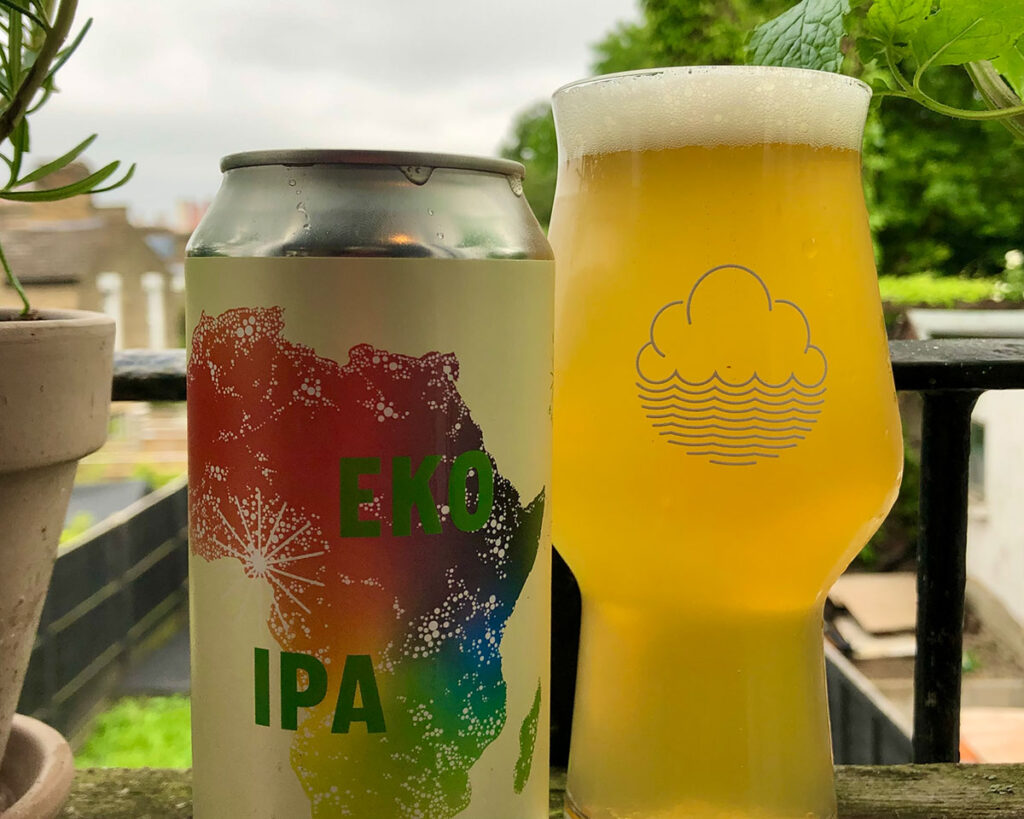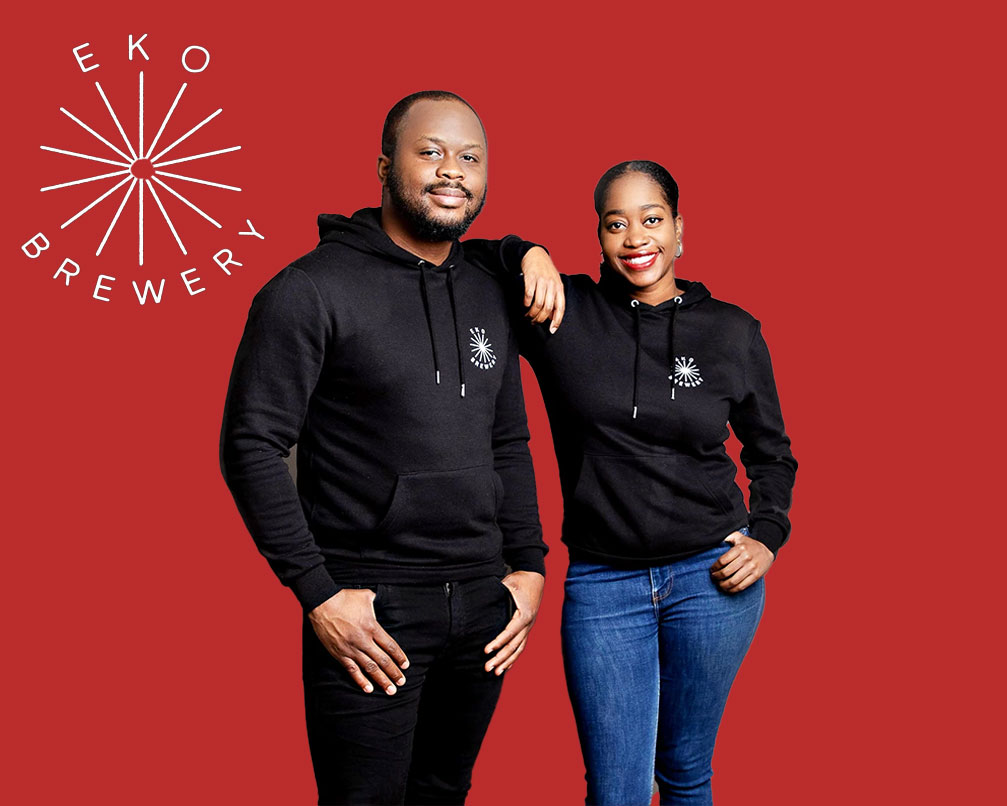Craft beer is about culture and traditions, stories and connection. In a world of mass-produced lagers and multinational corporations, craft brewers build brands around their personality and experiment with flavours that speak to their identity. They create communities to share their story with.
For Anthony and Helena Adedipe, the founders of EKO, a microbrewery in South East London, the story is one of migration and diaspora. Brewing is a way to reconnect with their African heritage. By bringing ingredients such as cassava, millet, sorghum and palm sugar into their brews, they are not only revolutionising the craft beer world – which is still heavily dominated by white men – but are also experimenting with flavours that remind them of home. “Our culture is still very much ingrained in us,” says Helena. “It was very important that, in whatever we did, we paid homage to that.”
Anthony was born in Lagos, Nigeria; home to the oldest Guinness brewery outside of the UK. One of his first memories of beer is his great grandmother drinking dark, malty stouts. Helena is from the Democratic Republic of Congo. Her family, especially her mother, were more into lagers. Both came to the UK as children and met in 2009. Today, they are married and have a daughter.
EKO brewery was born in 2019; the product of the couple’s love for beer and Anthony’s own experience with homebrewing. “I used to travel a lot for work, and I always loved to try the local beer,” says Anthony. “When I was in Japan, I went to visit the Sapporo brewery. That’s where I fell in love with the brewing process. A few years later I went to live in America, where the craft beer scene was blowing up – that was my gateway into the scene.”
Helena would visit Anthony during his year in America, where they would go to local taprooms together and try different beer styles. This was the beginning of their love story with craft beer. Back home in London, Anthony joined a group to learn homebrewing techniques, trying out his skills on professional equipment. But the couple didn’t want to brew just any kind of beer; they wanted to celebrate traditional brewing techniques from their countries.
First, they attempted a small-batch smoked porter – a smoky and bready dark beer – that uses chocolate and caramel malts. To brew a porter as a first beer is a risky endeavour for novice homebrewer; it is not the most popular beer style and the smokiness may have turned people off. But that was the beer Anthony liked and that his great grandma used to drink. “We decided to go with what we liked,” he says. “We tried it with friends and family first and it was well-received, so we said, ‘let’s see if we can make this bigger.’”
Helena and Anthony connect with a drinking culture that is centred on food – not salt and vinegar crisps or pork scratching, but full, nourishing meals like Jollof rice or barbeques. “Beer in Africa is always consumed with food. If you have some beer, there is always a dish to accompany it,” says Helena. “That’s something that means a lot to us. We wanted to make beers that were easy to drink, with a distinctive taste, but that wouldn’t overpower a dish.”
At first, the couple reached out to local restaurants in London to sell their beers. Their selling point was drinkability and low bitterness. Helena says their beers go well with a lot of different foods and dishes. “Barbecue food goes really well with our porter because of its smokiness,” she says. “But you can also pair it with spicy food, or even desserts, because it has chocolate and caramel malts that replicate sweet flavours.” When pairing beer and food, you might look for flavours that complement or contrast each other – some love spicy food and want to enhance its spiciness, others might want something to cool it down with.
EKO is the old name of Nigeria’s largest city Lagos and the brewery’s logo – a spark of light – represents the couple’s mission to celebrate the African continent through their beers. This is reflected in the ingredients they use. “We try to use ingredients from all over Africa, not just from our respective countries,” says Helena. “We use South African hops, staples like yam and cassava and, of course, palm sugar.”
Palm sugar is mostly used to make palm wine, an alcoholic drink consumed across the continent. “You cannot put palm wine into beer because it would ruin it. What you can do is make sugar from the same sap of coconut palm tree and put that into beer as a fermentable sugar,” says Anthony. “That’s what gives the beer a very unique taste.”
EKO brewed their delicious Haze – a New England IPA – using palm sugar. New England IPAs are usually hazy, pale beers with tropical fruits flavours, a juicy mouthfeel and an intense hop aroma. EKO’s twist is using palm sugar and not too many hops. “You get an initial sweetness because of the palm sugar, but you still get the bitterness that you associate with that style of beer,” says Anthony. “The addition of coconut palm sugar changes the colour as well, which became a unique thing for us.”
Traditional brews across the African continent are made using many of the ingredients that Anthony and Helena use, with one exception: they don’t use hops. In European-style beers today, hops are the main source of both bitterness and aroma. In traditional African brewing, flavour is given by starch and root vegetables rather than hops, giving the beers a higher nutritional value. At EKO, Anthony and Helena are making something unique by mixing these two traditions.
“We don’t yet have a beer that doesn’t include hops, but we do it consciously because we want to make sure the beer is accessible [in the UK] and easy to go with food. We brew beer with lower bitterness because, although we do use hops, we aren’t brewing very hoppy beers,” says Anthony.

Accessibility is an important value for EKO. Anthony says it’s great that we have specialised craft beer shops selling beers made with passion and ethics, but argues that some people might not find them accessible: “I think we have got to realise that not everyone can access these independent stores, because of their location or their culture,” he says. “They may drink beer, but not necessarily want to say that they drink.”
EKO was recently featured in Manchester-based Cloudwater “Beer with Ideas” series, which turned into a four-can-pack sold in Tesco. Alongside EKO, it featured Queer Brewing, a queer-led brewery from East London, Good Karma, a mindfulness-oriented and South East Asian-owned alcohol-free brewery and Rock Leopard, the only other black-owned brewery in the UK.
As far as diversity in the craft beer scene goes, Helena believes there is work to be done. “Pockets of people are trying to make a difference. There are a lot of women really trying to make the craft beer industry a more safe and diverse place,” she says. “But some people who drink craft beer feel like they can’t be part of that scene because they don’t see anybody that looks like them, or they feel, ‘other than beer, what have we got in common?’ But anyone can drink craft beer. Some people didn’t know black people were into beer. We’re like, come on!”
EKO’s new pale ale series features South African hops, which are rarely found in European beers. “Because of where they come from, it’s quite difficult to get hold of these hops,” says Helena. Her favourite is Southern Passion, a hop with a distinctive fruity and floral aromas. What EKO is doing remains unique in the craft beer scene. In the future, the couple says, the plan is “to keep brewing” and to work towards having their own site.
To a craft beer lover like me, this sounds like a great plan. And while looking forward to their next releases, I crack open a can of Haze. Its mango and tropical juice notes match perfectly with the sweet and punchy flavour of palm sugar. It is amazing to see what new ingredients can do in beer, when creativity meets tradition. This is the beauty of craft beer.
You can find EKO’s beers on their website, in some specialised shops and in some Nigerian restaurants around London, such as Chuku’s, Enish and Papa L’s Kitchen.
Read More

